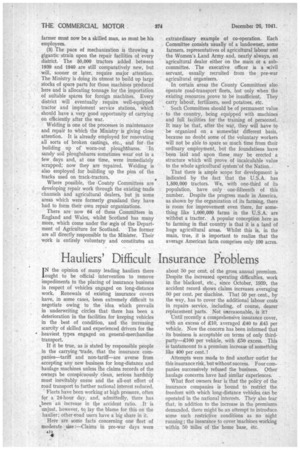Hauliers' Difficult Insurance P w roblems I N the opinion of many
Page 14

If you've noticed an error in this article please click here to report it so we can fix it.
leading hauliers there ought to be official intervention to remove impediments to the placing of insurance business in respect of vehicles engaged on long-distance work. Renewals of existing insurance• covers have, in some cases, been extremely difficult to negotiate owing to the idea which prevails in underwriting circles that there has been a deterioration in the facilities for keeping vehicles in the best of condition, and the increasing scarcity of skilled and experienced drivers for tke heaviest types engaged on general-merchandise transport.
If it be true, as is stated by responsible people in the carrying 'trade, that the insurance companies—tariff and non-tariff—are averse from accepting any new business for long-distance and haulage machines unless the claims records of the owners be conspicuously clean, serious hardship must inevitably ensue and the all-out effort of road transport to further national interest reduced.
Fleets have been working at high pressure, often for a 24-hour day, and, admittedly, there has been an increase in the accident ratio. It is unjust, however, to lay the blame for this on the haulier; other-road users have a big share in it.
Here are some facts concerning one fleet of moderate size :—Claims in pre-war days were about 50 per cent, of the gross, annual premium. Despite the increased operating difficulties, work in the blackout, etc., since October, 1939, the accident record shows claims increases averaging 50 per cent. per machine. That 50 pen cent., by the way, has to cover the additional labour costs in repairs service, including, of course, dearer replacement parts. Not unreasonable, is it?
Until recently a comprehensive insurance cover, with an excess of £10, averaged 240 to £45 per vehicle. Now the concern has been informed that its business is acceptable on terms of only thirdparty—£100 per vehicle, with £50 excess. This is tantamount to a premium increase of something like 400 per cent. !
Attempts were made to find another outlet for this insurance risk, but without success. Four companies successively refused the business. Other haulage concerns have had similar experiences.
What fleet owners fear is that the policy of the insurance companies is bound to restrict the freedom with which long-distance vehicles can be operated in the national interests. They also fear that, in addition to the increase in the premiums demanded, there might be an attempt to introduce some such restrictive conditions as no night running; the insurance to cover 'machines working within 50 miles of the home base, Mc.




















































